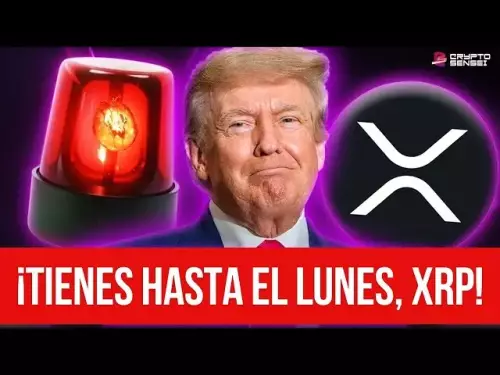-
 bitcoin
bitcoin $87959.907984 USD
1.34% -
 ethereum
ethereum $2920.497338 USD
3.04% -
 tether
tether $0.999775 USD
0.00% -
 xrp
xrp $2.237324 USD
8.12% -
 bnb
bnb $860.243768 USD
0.90% -
 solana
solana $138.089498 USD
5.43% -
 usd-coin
usd-coin $0.999807 USD
0.01% -
 tron
tron $0.272801 USD
-1.53% -
 dogecoin
dogecoin $0.150904 USD
2.96% -
 cardano
cardano $0.421635 USD
1.97% -
 hyperliquid
hyperliquid $32.152445 USD
2.23% -
 bitcoin-cash
bitcoin-cash $533.301069 USD
-1.94% -
 chainlink
chainlink $12.953417 USD
2.68% -
 unus-sed-leo
unus-sed-leo $9.535951 USD
0.73% -
 zcash
zcash $521.483386 USD
-2.87%
Bitcoin是龐氏騙局嗎?
Bitcoin's decentralized, transparent blockchain and real-world utility distinguish it from Ponzi schemes, despite its speculative price movements.
2025/07/08 15:42

了解龐氏騙局的定義
龐氏騙局是一個欺詐性的投資行動,其中回報現有投資者是由新投資者貢獻的資本支付的,而不是通過合法的商業活動獲得的利潤。該結構通常涉及高回報的承諾,幾乎沒有風險,並且當新投資流動不足以維持支出時,它會崩潰。
在Bitcoin的情況下,批評家偶爾將其價格波動和投機性質與此類計劃進行了比較。但是, Bitcoin在分散的區塊鍊網絡上運行,這意味著沒有中央權威控制它。通過涉及礦工和節點的共識機制來驗證交易,從根本上講,該機制將其與龐氏騙局等集中欺詐系統區分開來。
Bitcoin的分散性質和透明度
Bitcoin和傳統龐氏騙局之間的一個關鍵區別在於透明度和權力下放。所有Bitcoin交易都記錄在稱為區塊鏈的公共分類帳中,任何人都可以查看。這種開放性允許對每項交易進行實時驗證,並確保沒有一個實體可以操縱系統以謀取個人利益。
與龐氏案計劃(通常由一小部分人掩蓋和控制信息)不同,Bitcoin的代碼是開源的,其供應時間表是公開的。將2100萬BTC的總供應上限用於該協議,使其可預測且對任意通貨膨脹有抵抗力。
投機和市場動態的作用
批評家有時會爭辯說,Bitcoin由於其投機性價格變動而類似於龐氏騙局。像任何在金融市場上交易的資產一樣,Bitcoin的價值也受供求動態的影響。以較低價格購買Bitcoin的早期採用者可能會因採用率上漲和價格上漲而受益匪淺。
但是,這種現像不是Bitcoin唯一的。它發生在股票市場,房地產和其他投資工具中。在龐氏騙局中,不論任何基本價值或效用如何,都會使用後來參與者的資金來支付早期投資者。 Bitcoin持有人另一方面擁有一個可以轉讓,花費或持有的數字資產,而無需依靠新買家的未來流入。
比較Bitcoin與歷史財務泡沫
一些分析師將Bitcoin與歷史財務泡沫進行了比較,例如17世紀的鬱金香躁狂症或2000年代初期的互聯網崩潰。這些事件涉及快速價格上漲,然後急劇下降,這主要是由投機而不是內在價值驅動的。
但是, Bitcoin表現出了韌性和持續的效用,超出了猜測。它是某些經濟體的分散數字貨幣,價值存儲和抵抗通貨膨脹的對沖。與最終消失的投機氣泡不同,自2009年成立以來,Bitcoin一直保持著一致的存在,隨著時間的流逝,機構的興趣和監管認可的增加。
解決對騙局和欺詐使用的擔憂
儘管Bitcoin本身不是龐氏騙局,但多年來,它已在各種騙局和欺詐方案中使用。壞演員創建了假交易所,基於龐氏騙局的投資平台和金字塔計劃,承諾與Bitcoin相關的不現實回報。
這些虐待並不能反映Bitcoin的核心設計,而是突出了加密貨幣空間中盡職調查和教育的重要性。用戶應驗證平台的合法性,使用受信任的錢包,並避免出現似乎太好的報價。世界各地的監管機構對這種騙局發出了警告,強調Bitcoin是一項合法的技術,但惡意演員可能會濫用它。
- 在投資之前,請始終研究任何平台後面的團隊。
- 檢查該平台是否已在相關財務當局註冊。
- 避免服務有希望保證的回報或指數增長。
- 使用冷存儲解決方案來保護您的Bitcoin持有。
Bitcoin的收養和現實世界實用程序
除了猜測之外,Bitcoin已經獲得了吸引力,作為匯款,微交易和耐心付款的工具。像埃爾·薩爾瓦多(El Salvador)這樣的國家將其作為法定招標,而其他國家則探索了其跨境貿易和金融包容性的潛力。
它作為分散的貨幣制度的實用性挑戰了傳統的銀行業模式,並在貨幣不穩定或限制獲得金融服務的地區提供替代方案。與龐氏騙局(Ponzi)方案不同,該計劃由於不可持續的支付結構而自身的體重崩潰,Bitcoin在不同部門的使用和接受過程中繼續增長。
常見問題
問:是否有任何政府正式將Bitcoin歸類為龐氏騙局?沒有政府正式將Bitcoin標記為龐氏騙局。儘管一些監管機構已經發表了有關其風險的警告性陳述,但許多人認為它是合法的資產類別或數字貨幣形式。
問:為什麼有些人認為Bitcoin是龐氏騙局?關於Bitcoin如何運作的誤解,與媒體的轟動主義和與欺詐性項目的聯繫,有助於這種信念。批評家經常將投機行為與全身欺詐混為一談。
問:Bitcoin可以像龐氏騙局崩潰一樣失去其所有價值嗎?儘管Bitcoin是波動的,並且從理論上講可能會降至零值,但這將需要互聯網基礎架構,加密和用戶信任的前所未有的全球故障,與龐氏騙局的典型內部崩潰大不相同。
問:Bitcoin與與加密貨幣相關的多級營銷(MLM)方案有何不同? MLMS經常使用加密貨幣作為促進基於招聘的收入的立面,而Bitcoin獨立於此類結構。 Bitcoin的價值源於其網絡效應,而不是招募新用戶。
免責聲明:info@kdj.com
所提供的資訊並非交易建議。 kDJ.com對任何基於本文提供的資訊進行的投資不承擔任何責任。加密貨幣波動性較大,建議您充分研究後謹慎投資!
如果您認為本網站使用的內容侵犯了您的版權,請立即聯絡我們(info@kdj.com),我們將及時刪除。
- Coinbase 與 Crypto ISAC 結成聯盟,為數字資產世界的安全情報製定新標準
- 2026-01-31 04:35:01
- 美國造幣廠以 2026 年薩卡加維亞硬幣紀念革命戰爭英雄波莉·庫珀
- 2026-01-31 03:55:01
- 避險拋售狂潮中,比特幣觸及 8.3 萬美元,ETF 出現大規模資金外流
- 2026-01-31 04:35:01
- 新版 2026 年一元硬幣彰顯奧奈達女英雄波莉·庫珀和美國的第一批盟友
- 2026-01-31 04:15:01
- 奧奈達女性波莉·庫珀因革命戰爭英雄主義榮獲 2026 年 1 美元硬幣
- 2026-01-31 04:25:01
- 奧奈達女英雄波莉·庫珀在新版 1 美元硬幣上永垂不朽:對革命慷慨的遲來的致敬
- 2026-01-31 04:25:01
相關知識

Bitcoin 的總供應量是多少?
2025-10-10 13:55:11
Bitcoin 的總供應量1. Bitcoin的總供應量上限為2100萬枚。此限制被硬編碼到 Bitcoin 協議中,如果不對網絡共識規則進行根本性改變,則無法更改。 2. 截至目前,已開採超過 1900 萬枚 Bitcoin。這意味著通過採礦過程釋放的數量不足 200 萬。 3. 通過給予礦工的區...

您可以購買 Bitcoin 的一小部分嗎?
2025-10-10 18:01:25
了解部分 Bitcoin 所有權1. 是的,您可以購買 Bitcoin 的一小部分。 Bitcoin 的最小單位稱為聰,代表單個 Bitcoin 的億分之一(0.00000001 BTC)。這種可分割性允許投資者參與市場,而不管 Bitcoin 每枚代幣的價格很高。 2. 大多數加密貨幣交易所都支持...

第一次如何購買Bitcoin?
2025-10-21 11:00:49
了解 Bitcoin 及其價值1. Bitcoin 是一種去中心化的數字貨幣,在點對點網絡上運行,無需銀行或政府等中介機構。它是由一位名叫中本聰 (Satoshi Nakamoto) 的匿名實體於 2009 年創建的。 2100 萬枚代幣的有限供應加劇了其稀缺性和價值。 2. Bitcoin的價格根...

為什麼Bitcoin被認為是革命性的技術?
2025-08-12 20:29:18
權力下放和消除中央當局Bitcoin背後的核心創新在於其分散式體系結構,從根本上挑戰了傳統的金融體系。與中央銀行或金融機構管理的傳統貨幣不同, Bitcoin在沒有單個實體可以控制的對等網絡上運行。這意味著交易由節點的分佈式網絡驗證和記錄,從而消除了對銀行或付款處理器等中介機構的需求。缺乏中央權威會...

為什麼Bitcoin被認為是革命性的技術?
2025-08-10 19:42:58
分散的架構和無信任的交易Bitcoin被認為是革命性的,因為它引入了一個分散的建築,該體系結構在不依賴銀行或政府等中央當局的情況下運作。在傳統的金融系統中,信任被置於中介機構以驗證和記錄交易。 Bitcoin通過使用一個對等網絡,每個參與者(節點)維護所有交易的公共分類帳的副本,從而消除了這一需求。...

Bitcoin的關鍵功能是什麼?
2025-08-10 02:50:11
權力下放和對等網絡Bitcoin最定義的特徵之一是它的分散性質。與依靠中央當局(例如銀行或政府)的傳統金融系統不同,Bitcoin在點對點網絡上運行,該網絡由分佈式節點網絡驗證和記錄交易。這意味著沒有一個實體可以控制整個系統。網絡中的每個參與者都可以在沒有中介機構的情況下直接發送和接收付款。該區塊鏈...

Bitcoin 的總供應量是多少?
2025-10-10 13:55:11
Bitcoin 的總供應量1. Bitcoin的總供應量上限為2100萬枚。此限制被硬編碼到 Bitcoin 協議中,如果不對網絡共識規則進行根本性改變,則無法更改。 2. 截至目前,已開採超過 1900 萬枚 Bitcoin。這意味著通過採礦過程釋放的數量不足 200 萬。 3. 通過給予礦工的區...

您可以購買 Bitcoin 的一小部分嗎?
2025-10-10 18:01:25
了解部分 Bitcoin 所有權1. 是的,您可以購買 Bitcoin 的一小部分。 Bitcoin 的最小單位稱為聰,代表單個 Bitcoin 的億分之一(0.00000001 BTC)。這種可分割性允許投資者參與市場,而不管 Bitcoin 每枚代幣的價格很高。 2. 大多數加密貨幣交易所都支持...

第一次如何購買Bitcoin?
2025-10-21 11:00:49
了解 Bitcoin 及其價值1. Bitcoin 是一種去中心化的數字貨幣,在點對點網絡上運行,無需銀行或政府等中介機構。它是由一位名叫中本聰 (Satoshi Nakamoto) 的匿名實體於 2009 年創建的。 2100 萬枚代幣的有限供應加劇了其稀缺性和價值。 2. Bitcoin的價格根...

為什麼Bitcoin被認為是革命性的技術?
2025-08-12 20:29:18
權力下放和消除中央當局Bitcoin背後的核心創新在於其分散式體系結構,從根本上挑戰了傳統的金融體系。與中央銀行或金融機構管理的傳統貨幣不同, Bitcoin在沒有單個實體可以控制的對等網絡上運行。這意味著交易由節點的分佈式網絡驗證和記錄,從而消除了對銀行或付款處理器等中介機構的需求。缺乏中央權威會...

為什麼Bitcoin被認為是革命性的技術?
2025-08-10 19:42:58
分散的架構和無信任的交易Bitcoin被認為是革命性的,因為它引入了一個分散的建築,該體系結構在不依賴銀行或政府等中央當局的情況下運作。在傳統的金融系統中,信任被置於中介機構以驗證和記錄交易。 Bitcoin通過使用一個對等網絡,每個參與者(節點)維護所有交易的公共分類帳的副本,從而消除了這一需求。...

Bitcoin的關鍵功能是什麼?
2025-08-10 02:50:11
權力下放和對等網絡Bitcoin最定義的特徵之一是它的分散性質。與依靠中央當局(例如銀行或政府)的傳統金融系統不同,Bitcoin在點對點網絡上運行,該網絡由分佈式節點網絡驗證和記錄交易。這意味著沒有一個實體可以控制整個系統。網絡中的每個參與者都可以在沒有中介機構的情況下直接發送和接收付款。該區塊鏈...
看所有文章










































































